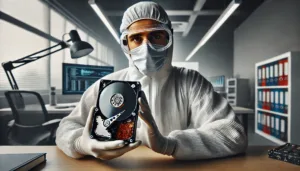Losing important data is stressful enough without worrying about who will see your private information during the recovery process. Whether it’s sensitive financial records, personal family photos, or your company’s critical documents, the big question is: Can I trust a data recovery company with my files? Let’s break it down and help you make an informed decision.
Do Data Recovery Companies Look at Your Files?
The truth is, when you hand over a hard drive or device to a data recovery company, someone will inevitably need to access your data. This is often necessary to ensure the recovery was successful. For example, technicians may check the file names or open some files to confirm the integrity of the recovery process. While it’s unavoidable that a human will interact with your data, a reputable company will have strict protocols in place to protect your privacy.
At companies like Drivesavers, Secure Data, and Jet Data Recovery, professionals work in secure environments, like cleanrooms, designed to ensure your data is treated carefully. Only authorized personnel have access to these areas, and these companies pride themselves on using highly secure methods to recover and return your data without compromising your privacy.
What Are the Privacy Protocols in Data Recovery Labs?
One of the key concerns people have is whether their data will be kept safe while it’s being recovered. Trusted companies make sure to implement a range of security measures to prevent unauthorized access. For example, Jet Data Recovery emphasizes that they create a clone of your data, which is stored temporarily and securely in their lab until the recovery process is complete. After you receive your recovered files, they permanently erase the clone from their system within a week to 30 days (or sooner, depending on your request).
In professional labs, employees undergo background checks and receive training in IT security and data handling. These labs are often SOC 2 Type II audited, ensuring they meet strict standards for security, availability, and confidentiality. This means they are serious about maintaining the safety and privacy of your sensitive data, whether it’s personal information or even HIPAA-protected medical records.
What About Pirated Media or Questionable Content?
Another common concern is whether recovery engineers will report illegal content, such as pirated movies or software. The short answer is: No, they won’t — unless it’s a legal requirement. While there are certain types of content, such as child endangerment material, that they are legally obligated to report, they generally don’t care about your downloaded movies or ripped DVDs.
Data recovery engineers emphasize that they don’t have the time or the interest to look through your files unless it’s necessary to confirm that the recovery was successful. Their job is to recover data, not make judgments about what’s on your hard drive. So, if you’re worried about your old movie collection, it’s not likely to raise any red flags.
How to Choose a Trustworthy Data Recovery Company
Not every data recovery provider follows the same strict protocols, so it’s important to do your research. Here are some key questions to ask when choosing a data recovery company:
- Who will access my data? Make sure the company has certified engineers handling your device and that they aren’t outsourcing the recovery to a third party.
- What are their privacy measures? Look for companies that are transparent about their security measures, like encryption standards and access control, and ask if they’re audited by independent groups.
- Do they offer a Non-Disclosure Agreement (NDA)? For extra peace of mind, many companies will sign an NDA, legally binding them to safeguard your information.
At Steve’s Computer Repair, for example, privacy isn’t just a policy — it’s part of our core culture. We understand that behind every recovery request is a person with sensitive data, and we treat it with the respect it deserves.
What About DIY Data Recovery Software?
If you’re still hesitant about handing over your drive to a company, you might be tempted to try data recovery software at home. While this can be a good solution for minor issues, it comes with risks. One major concern is overwriting the very data you’re trying to recover. Every time your computer writes new data to the drive, the chances of a successful recovery drop. Installing recovery software on the same drive where the data was lost can unintentionally make things worse.
In cases of physical damage, running software on a compromised drive could cause irreversible harm, making professional recovery harder or even impossible. If you suspect physical damage (for example, if your hard drive is making strange noises), it’s best to avoid DIY software and go straight to a professional.
Final Thoughts: How Safe is Your Data with a Recovery Company?

Ultimately, the safety of your data depends on the company you choose. Reputable data recovery companies understand the importance of your privacy and have rigorous processes in place to protect it. Whether it’s handling your data in secure, audited facilities or ensuring that unauthorized employees don’t have access to sensitive information, the best providers go above and beyond to earn your trust.
If you’re facing data loss and are concerned about privacy, remember that it’s okay to ask questions. We at Steve’s Computer Repair will always be transparent about how we handle your data and offer clear security guarantees. For peace of mind, please choose a provider that takes both their recovery work and your privacy seriously.
Still have questions or concerns? Call us at (210) 241-2054 and we’ll answer any questions, concerns, and help you start the data recovery process.

